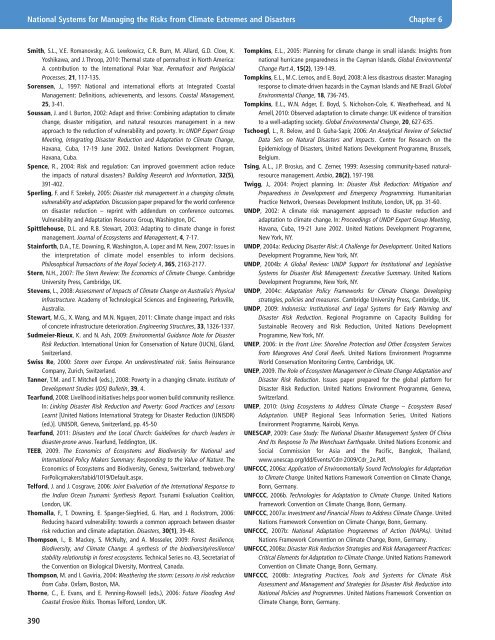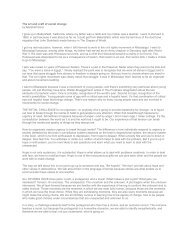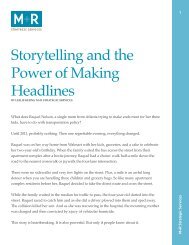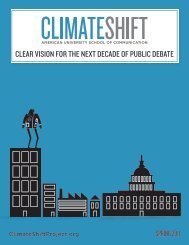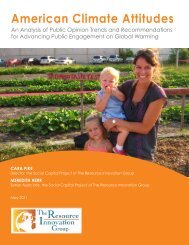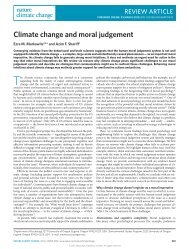National Systems for <strong>Managing</strong> the <strong>Risks</strong> from <strong>Climate</strong> <strong>Extreme</strong>s and DisastersChapter 6Smith, S.L., V.E. Romanovsky, A.G. Lewkowicz, C.R. Burn, M. Allard, G.D. Clow, K.Yoshikawa, and J. Throop, 2010: Thermal state <strong>of</strong> permafrost in North America:A contribution to the International Polar Year. Permafrost and PeriglacialProcesses, 21, 117-135.Sorensen, J., 1997: National and international efforts at Integrated CoastalManagement: Definitions, achievements, and lessons. Coastal Management,25, 3-41.Soussan, J. and I. Burton, 2002: Adapt and thrive: Combining adaptation to climatechange, disaster mitigation, and natural resources management in a newapproach to the reduction <strong>of</strong> vulnerability and poverty. In: UNDP Expert GroupMeeting, Integrating Disaster Reduction and Adaptation to <strong>Climate</strong> Change,Havana, Cuba, 17-19 June 2002. United Nations Development Program,Havana, Cuba.Spence, R., 2004: Risk and regulation: Can improved government action reducethe impacts <strong>of</strong> natural disasters? Building Research and Information, 32(5),391-402.Sperling, F. and F. Szekely, 2005: Disaster risk management in a changing climate,vulnerability and adaptation. Discussion paper prepared for the world conferenceon disaster reduction – reprint with addendum on conference outcomes.Vulnerability and Adaptation Resource Group, Washington, DC.Spittlehouse, D.L. and R.B. Stewart, 2003: Adapting to climate change in forestmanagement. Journal <strong>of</strong> Ecosystems and Management, 4, 7-17.Stainforth, D.A., T.E. Downing, R. Washington, A. Lopez and M. New, 2007: Issues inthe interpretation <strong>of</strong> climate model ensembles to inform decisions.Philosophical Transactions <strong>of</strong> the Royal Society A, 365, 2163-2177.Stern, N.H., 2007: The Stern Review: The Economics <strong>of</strong> <strong>Climate</strong> Change. CambridgeUniversity Press, Cambridge, UK.Stevens, L., 2008: Assessment <strong>of</strong> Impacts <strong>of</strong> <strong>Climate</strong> Change on Australia’s PhysicalInfrastructure. Academy <strong>of</strong> Technological Sciences and Engineering, Parksville,Australia.Stewart, M.G., X. Wang, and M.N. Nguyen, 2011: <strong>Climate</strong> change impact and risks<strong>of</strong> concrete infrastructure deterioration. Engineering Structures, 33, 1326-1337.Sudmeier-Rieux, K. and N. Ash, 2009: Environmental Guidance Note for DisasterRisk Reduction. International Union for Conservation <strong>of</strong> Nature (IUCN), Gland,Switzerland.Swiss Re, 2000: Storm over Europe. An underestimated risk. Swiss ReinsuranceCompany, Zurich, Switzerland.Tanner, T.M. and T. Mitchell (eds.), 2008: Poverty in a changing climate. Institute <strong>of</strong>Development Studies (IDS) Bulletin, 39, 4.Tearfund, 2008: Livelihood initiatives helps poor women build community resilience.In: Linking Disaster Risk Reduction and Poverty: Good Practices and LessonsLearnt [United Nations International Strategy for Disaster Reduction (UNISDR)(ed.)]. UNISDR, Geneva, Switzerland, pp. 45-50Tearfund, 2011: Disasters and the Local Church: Guidelines for church leaders indisaster-prone areas. Tearfund, Teddington, UK.TEEB, 2009. The Economics <strong>of</strong> Ecosystems and Biodiversity for National andInternational Policy Makers Summary: Responding to the Value <strong>of</strong> Nature. TheEconomics <strong>of</strong> Ecosystems and Biodiversity, Geneva, Switzerland, teebweb.org/ForPolicymakers/tabid/1019/Default.aspx.Telford, J. and J. Cosgrave, 2006: Joint Evaluation <strong>of</strong> the International Response tothe Indian Ocean Tsunami: Synthesis Report. Tsunami Evaluation Coalition,London, UK.Thomalla, F., T. Downing, E. Spanger-Siegfried, G. Han, and J. Rockstrom, 2006:Reducing hazard vulnerability: towards a common approach between disasterrisk reduction and climate adaptation. Disasters, 30(1), 39-48.Thompson, I., B. Mackey, S. McNulty, and A. Mosseler, 2009: Forest Resilience,Biodiversity, and <strong>Climate</strong> Change. A synthesis <strong>of</strong> the biodiversity/resilience/stability relationship in forest ecosystems. Technical Series no. 43, Secretariat <strong>of</strong>the Convention on Biological Diversity, Montreal, Canada.Thompson, M. and I. Gaviria, 2004: Weathering the storm: Lessons in risk reductionfrom Cuba. Oxfam, Boston, MA.Thorne, C., E. Evans, and E. Penning-Rowsell (eds.), 2006: Future Flooding AndCoastal Erosion <strong>Risks</strong>. Thomas Telford, London, UK.Tompkins, E.L., 2005: Planning for climate change in small islands: Insights fromnational hurricane preparedness in the Cayman Islands. Global EnvironmentalChange Part A, 15(2), 139-149.Tompkins, E.L., M.C. Lemos, and E. Boyd, 2008: A less disastrous disaster: <strong>Managing</strong>response to climate-driven hazards in the Cayman Islands and NE Brazil. GlobalEnvironmental Change, 18, 736-745.Tompkins, E.L., W.N. Adger, E. Boyd, S. Nicholson-Cole, K. Weatherhead, and N.Arnell, 2010: Observed adaptation to climate change: UK evidence <strong>of</strong> transitionto a well-adapting society. Global Environmental Change, 20, 627-635.Tschoegl, L., R. Below, and D. Guha-Sapir, 2006: An Analytical Review <strong>of</strong> SelectedData Sets on Natural Disasters and Impacts. Centre for Research on theEpidemiology <strong>of</strong> Disasters, United Nations Development Programme, Brussels,Belgium.Tsing, A.L., J.P. Brosius, and C. Zerner, 1999: Assessing community-based naturalresourcemanagement. Ambio, 28(2), 197-198.Twigg, J., 2004: Project planning. In: Disaster Risk Reduction: Mitigation andPreparedness in Development and Emergency Programming. HumanitarianPractice Network, Overseas Development Institute, London, UK, pp. 31-60.UNDP, 2002: A climate risk management approach to disaster reduction andadaptation to climate change. In: Proceedings <strong>of</strong> UNDP Expert Group Meeting,Havana, Cuba, 19-21 June 2002. United Nations Development Programme,New York, NY.UNDP, 2004a: Reducing Disaster Risk: A Challenge for Development. United NationsDevelopment Programme, New York, NY.UNDP, 2004b: A Global Review: UNDP Support for Institutional and LegislativeSystems for Disaster Risk Management: Executive Summary. United NationsDevelopment Programme, New York, NY.UNDP, 2004c: Adaptation Policy Frameworks for <strong>Climate</strong> Change. Developingstrategies, policies and measures. Cambridge University Press, Cambridge, UK.UNDP, 2009: Indonesia: Institutional and Legal Systems for Early Warning andDisaster Risk Reduction. Regional Programme on Capacity Building forSustainable Recovery and Risk Reduction, United Nations DevelopmentProgramme, New York, NY.UNEP, 2006: In the Front Line: Shoreline Protection and Other Ecosystem Servicesfrom Mangroves And Coral Reefs. United Nations Environment ProgrammeWorld Conservation Monitoring Centre, Cambridge, UK.UNEP, 2009. The Role <strong>of</strong> Ecosystem Management in <strong>Climate</strong> Change Adaptation andDisaster Risk Reduction. Issues paper prepared for the global platform forDisaster Risk Reduction. United Nations Environment Programme, Geneva,Switzerland.UNEP, 2010: Using Ecosystems to Address <strong>Climate</strong> Change – Ecosystem BasedAdaptation. UNEP Regional Seas Information Series, United NationsEnvironment Programme, Nairobi, Kenya.UNESCAP, 2009: Case Study: The National Disaster Management System Of ChinaAnd Its Response To The Wenchuan Earthquake. United Nations Economic andSocial Commission for Asia and the Pacific, Bangkok, Thailand,www.unescap.org/Idd/<strong>Events</strong>/Cdrr-2009/Cdr_2e.Pdf.UNFCCC, 2006a: Application <strong>of</strong> Environmentally Sound Technologies for Adaptationto <strong>Climate</strong> Change. United Nations Framework Convention on <strong>Climate</strong> Change,Bonn, Germany.UNFCCC, 2006b. Technologies for Adaptation to <strong>Climate</strong> Change. United NationsFramework Convention on <strong>Climate</strong> Change, Bonn, Germany.UNFCCC, 2007a: Investment and Financial Flows to Address <strong>Climate</strong> Change. UnitedNations Framework Convention on <strong>Climate</strong> Change, Bonn, Germany.UNFCCC, 2007b: National Adaptation Programmes <strong>of</strong> Action (NAPAs). UnitedNations Framework Convention on <strong>Climate</strong> Change, Bonn, Germany.UNFCCC, 2008a: Disaster Risk Reduction Strategies and Risk Management Practices:Critical Elements for Adaptation to <strong>Climate</strong> Change. United Nations FrameworkConvention on <strong>Climate</strong> Change, Bonn, Germany.UNFCCC, 2008b: Integrating Practices, Tools and Systems for <strong>Climate</strong> RiskAssessment and Management and Strategies for Disaster Risk Reduction intoNational Policies and Programmes. United Nations Framework Convention on<strong>Climate</strong> Change, Bonn, Germany.390
Chapter 6National Systems for <strong>Managing</strong> the <strong>Risks</strong> from <strong>Climate</strong> <strong>Extreme</strong>s and DisastersUNFCCC, 2009a: Potential Costs and Benefits <strong>of</strong> Adaptation Options: A Review <strong>of</strong>Existing Literature. Technical Paper, United Nations Framework Convention on<strong>Climate</strong> Change, Bonn, Germany.UNFCCC, 2011a: NAPA Priorities Database. United Nations Framework Conventionon <strong>Climate</strong> Change, Bonn, Germany, unfccc.int/cooperation_support/least_developed_countries_portal/napa_priorities_database/items/4583.php.UNFCCC, 2011b: Frequently Asked Questions about LDCs, the LEG and NAPAs.United Nations Framework Convention on <strong>Climate</strong> Change, Bonn, Germany,unfccc.int/cooperation_support/least_developed_countries_portal/frequently_asked_questions/items/4743.php.UNISDR, 2004: Living with Risk: A Global Review <strong>of</strong> Disaster Reduction Initiative.United Nations International Strategy for Disaster Reduction, Geneva, Switzerland.UNISDR, 2005: Hyogo Framework for Action 2005–2015: Building the resilience <strong>of</strong>nations and communities to disasters. United Nations International Strategy forDisaster Reduction, Geneva, Switzerland.UNISDR, 2006: Developing Early Warning Systems: A checklist. The conclusions <strong>of</strong>the third international conference on early warning. Germany, Bonn, 27-29.United Nations International Strategy for Disaster Reduction, Geneva, Switzerland.UNISDR, 2007a: Building Disaster Resilient Communities: Good Practices andLessons Learned. United Nations International Strategy for Disaster Reduction,Geneva, Switzerland.UNISDR, 2007b: Words into Action: A Guide for Implementing the Hyogo Framework.United Nations International Strategy for Disaster Reduction, Geneva, Switzerland.UNISDR, 2007c: ‘Acting with Common Purpose’. Proceedings <strong>of</strong> the first session <strong>of</strong>the Global Platform on Disaster Risk Reduction. Geneva, 5-7 June 2007, UnitedNations International Strategy for Disaster Reduction, Geneva, Switzerland.UNISDR, 2008a: Linking Disaster Risk Reduction and Poverty Reduction: GoodPractices and Lessons Learnt. United Nations International Strategy for DisasterReduction, Geneva, Switzerland.UNISDR, 2008b: Towards National Resilience: Good practices <strong>of</strong> National Platformsfor Disaster Risk Reduction. United Nations International Strategy for DisasterReduction, Geneva, Switzerland.UNISDR, 2009a: Adaptation to <strong>Climate</strong> Change by Reducing Disaster <strong>Risks</strong>: CountryPractices and Lessons. United Nations International Strategy for DisasterReduction, Geneva, Switzerland.UNISDR, 2009b: Applying Disaster Risk Reduction for <strong>Climate</strong> Change Adaptation:Country Practices and Lessons. United Nations International Strategy forDisaster Reduction, Geneva, Switzerland.UNISDR, 2009c: Risk and Poverty in a Changing <strong>Climate</strong>: Global Assessment Reporton Disaster Risk Reduction. United Nations International Strategy for DisasterReduction, Geneva, Switzerland.UNISDR, 2009d: Recommendations <strong>of</strong> National Platforms to the Chair andParticipants <strong>of</strong> the Second Session <strong>of</strong> the Global Platform for Disaster RiskReduction. United Nations International Strategy for Disaster Reduction,Geneva, Switzerland.UNISDR, 2010: Early Warning Practices can Save Many Lives: Good Practices andLessons Learned. United Nations International Strategy for Disaster Reduction,Geneva, Switzerland.UNISDR, 2011a: 2011 Global Assessment Report on Disaster Risk Reduction:Revealing Risk, Redefining Development. United Nations International Strategyfor Disaster Reduction, Geneva, Switzerland.UNISDR, 2011b: Hyogo Framework for Action 2005-2015: Mid Term Review. UnitedNations International Strategy for Disaster Reduction, Geneva, Switzerland.UNISDR/DKKV/Council <strong>of</strong> Europe, 2008: Disaster risk reduction in Europe:Overview <strong>of</strong> European National Platforms, Hyogo Framework for Action focalpoints and regional organisations and institutions. United Nations InternationalStrategy for Disaster Reduction, German Committee for Disaster RiskReduction, and Council <strong>of</strong> Europe.Urwin, K. and A. Jordan, 2008: Does public policy support or undermine climatechange adaptation? Exploring policy interplay across different scales <strong>of</strong>governance. Global Environmental Change, 18(1), 180-191.Van Buskirk, R., 2006: Analysis <strong>of</strong> long-range clean energy investment scenarios forEritrea, East Africa. Energy Policy, 34(14), 1807-1817.Varangis, P., J.R. Skees, and B.J. Barnett, 2002: Weather indexes for developingcountries. In: <strong>Climate</strong> Risk and the Weather Market [Dischel, B. (ed.)]. RiskBooks, London, UK, pp. 279-294.Venter, O., W.F. Laurance, T. Iwamura, K.A. Wilson, R.A. Fuller, and H.P. Possingham,2009: Harnessing carbon payments to protect biodiversity. Science, 326(5958),1368.Venton, P. and S. La Trobe, 2008: Linking <strong>Climate</strong> Change Adaptation and DisasterRisk Reduction. Tearfund, Tweddington, UK.Verdin, J., C. Funk, G. Senay, and R. Choularton, 2005: <strong>Climate</strong> science andfamine early warning. Philosophical Transactions <strong>of</strong> the Royal Society B, 360,2155-2168.Vignola, R., B. Locatelli, C. Martinez, and P. Imbach, 2009: Ecosystem-based adaptationto climate change: What role for policy-makers, society and scientists?Mitigation and Adaptation Strategies for Global Change, 8(14), 691-696.Virtanin, P., E. Palmujpki, and D. Gemechu, 2011: Global climate policies, localinstitutions and food security in a pastoral society in Ethiopia. Consilience: TheJournal <strong>of</strong> Sustainable Development, 5, 96-118.Vogel, C., and K. O’Brien, 2006: Who can eat information? Examining the effectiveness<strong>of</strong> seasonal climate forecasts and regional climate-risk management strategies.<strong>Climate</strong> Research, 33, 111-122.Walters, C., 1997. Challenges in adaptive management <strong>of</strong> riparian and coastalecosystems. Conservation Ecology, 2(1), 1.Wamsler, C., 2004: <strong>Managing</strong> urban risk: Perceptions <strong>of</strong> housing and planning as atool for reducing disaster risk. Global Built Environment Review, 4(2), 11-28.Warhurst, A., 2006: Disaster Prevention: A Role for Business? Maplecr<strong>of</strong>t andProVention Consortium, Geneva, Switzerland.Warner, K., N. Ranger, S. Surminski, M. Arnold, J. Linnnerooth-Bayer, E. Michel-Kerjan,P. Kovacs, and C. Herweijer, 2009: Adaptation to <strong>Climate</strong> Change: LinkingDisaster Risk Reduction and Insurance. United Nations International Strategyfor Disaster Reduction Secretariat, Geneva, Switzerland.Weih, M., 2004: Intensive short rotation forestry in boreal climates: Present andfuture perspectives. Canadian Journal <strong>of</strong> Forest Research, 34(7), 1369-1378.White, P., M. Pelling, K. Sen, D. Seddon, S. Russell, and R. Few, 2004: Disaster RiskReduction: A Development Concern. A Scoping Study on Links between DisasterRisk Reduction, Poverty and Development. Department for InternationalDevelopment, London, UK.WHO, 2003: <strong>Climate</strong> Change and Human Health - <strong>Risks</strong> and Responses: Summary.World Health Organization, Geneva, Switzerland.WHO, 2005: Health and <strong>Climate</strong> Change: The “Now and How”: A Policy Action Guide.World Health Organization Regional Office for Europe, Copenhagen, Denmark.Wickham, F., J. Kinch, and P.N. Lal, 2009: Institutional Capacity within MelanesianCountries to Effectively Respond to <strong>Climate</strong> Change Impacts, with a Focus onVanuatu and the Solomon Islands. A report prepared for the Bishop Museumand SPREP. Bishop Museum, Honolulu, Hawaii.Wilby, R.L., 2007: A review <strong>of</strong> climate change impacts on the built environment. BuiltEnvironment, 33(1), 31-45.Wilby, R.L., 2009: <strong>Climate</strong> for Development in South Asia (ClimDev-SAsia): Aninventory <strong>of</strong> cooperative programmes and sources <strong>of</strong> climate risk informationto support robust adaptation. Report prepared on behalf <strong>of</strong> the UK Departmentfor International Development (DFID), DFID, London, UK.Wilby, R.L. and S. Dessai, 2010: Robust adaptation to climate change. Weather,65(7), 180-185.Wilby, R.L., J. Troni, Y. Biot, L. Tedd, B.C. Hewitson, D.M. Smith, and R.T. Sutton, 2009:A review <strong>of</strong> climate risk information for adaptation and development planning.International Journal <strong>of</strong> Climatology, 29(9), 1193-1215.Wilches-Chaux, G., 2008: ¿Qu-ENOS pasa? – Guía de LA RED para la gestión radicalde riesgos asociados con el fenómeno ENOS. LA RED, Bogotá, Colombia.Wisner, B., 2011: Are we there yet? Reflections on integrated disaster risk managementafter ten years. Journal <strong>of</strong> Integrated Disaster Risk Management, 1, 1-14.Wisner, B. and J. Adams, 2002: Environmental Health in Emergencies and Disasters:A Practical Guide. World Health Organization, Geneva, Switzerland.Wisner, B., P. Blaikie, T. Cannon, and I. Davis, 2004: At Risk: Natural Hazards, People’sVulnerability And Disasters. 2nd ed. Routledge, London, UK.391
- Page 1:
MANAGING THE RISKS OF EXTREMEEVENTS
- Page 5:
Managing the Risks of Extreme Event
- Page 9 and 10:
I Foreword and Preface
- Page 12 and 13:
Prefacein understanding and managin
- Page 17 and 18:
Summary for PolicymakersBox SPM.1 |
- Page 19 and 20:
Summary for PolicymakersB.or sub-na
- Page 21 and 22:
Summary for PolicymakersIt is likel
- Page 23:
Summary for Policymakersmicro-insur
- Page 27 and 28:
Summary for PolicymakersIt is very
- Page 29 and 30:
Summary for PolicymakersOther low-r
- Page 31 and 32:
Summary for PolicymakersTable SPM.1
- Page 33 and 34:
Summary for PolicymakersBox SPM.2 |
- Page 35:
III Chapters 1 to 9
- Page 38 and 39:
Climate Change: New Dimensions in D
- Page 40 and 41:
Climate Change: New Dimensions in D
- Page 42 and 43:
Climate Change: New Dimensions in D
- Page 44 and 45:
Climate Change: New Dimensions in D
- Page 46 and 47:
Climate Change: New Dimensions in D
- Page 48 and 49:
Climate Change: New Dimensions in D
- Page 50 and 51:
Climate Change: New Dimensions in D
- Page 52 and 53:
Climate Change: New Dimensions in D
- Page 54 and 55:
Climate Change: New Dimensions in D
- Page 56 and 57:
Climate Change: New Dimensions in D
- Page 58 and 59:
Climate Change: New Dimensions in D
- Page 60 and 61:
Climate Change: New Dimensions in D
- Page 62 and 63:
Climate Change: New Dimensions in D
- Page 64 and 65:
Climate Change: New Dimensions in D
- Page 66 and 67:
Climate Change: New Dimensions in D
- Page 68 and 69:
Climate Change: New Dimensions in D
- Page 70 and 71:
Climate Change: New Dimensions in D
- Page 72 and 73:
Climate Change: New Dimensions in D
- Page 74 and 75:
Climate Change: New Dimensions in D
- Page 76 and 77:
Climate Change: New Dimensions in D
- Page 78 and 79:
Determinants of Risk: Exposure and
- Page 80 and 81:
Determinants of Risk: Exposure and
- Page 82 and 83:
Determinants of Risk: Exposure and
- Page 84 and 85:
Determinants of Risk: Exposure and
- Page 86 and 87:
Determinants of Risk: Exposure and
- Page 88 and 89:
Determinants of Risk: Exposure and
- Page 90 and 91:
Determinants of Risk: Exposure and
- Page 92 and 93:
Determinants of Risk: Exposure and
- Page 94 and 95:
Determinants of Risk: Exposure and
- Page 96 and 97:
Determinants of Risk: Exposure and
- Page 98 and 99:
Determinants of Risk: Exposure and
- Page 100 and 101:
Determinants of Risk: Exposure and
- Page 102 and 103:
Determinants of Risk: Exposure and
- Page 104 and 105:
Determinants of Risk: Exposure and
- Page 106 and 107:
Determinants of Risk: Exposure and
- Page 108 and 109:
Determinants of Risk: Exposure and
- Page 110 and 111:
Determinants of Risk: Exposure and
- Page 112 and 113:
Determinants of Risk: Exposure and
- Page 114 and 115:
Determinants of Risk: Exposure and
- Page 116 and 117:
Determinants of Risk: Exposure and
- Page 118 and 119:
Determinants of Risk: Exposure and
- Page 120 and 121:
Determinants of Risk: Exposure and
- Page 122 and 123:
Changes in Climate Extremes and the
- Page 124 and 125:
Changes in Climate Extremes and the
- Page 126 and 127:
Changes in Climate Extremes and the
- Page 128 and 129:
Changes in Climate Extremes and the
- Page 130 and 131:
Changes in Climate Extremes and the
- Page 132 and 133:
Changes in Climate Extremes and the
- Page 134 and 135:
Changes in Climate Extremes and the
- Page 136 and 137:
Changes in Climate Extremes and the
- Page 138 and 139:
Changes in Climate Extremes and the
- Page 140 and 141:
Changes in Climate Extremes and the
- Page 142 and 143:
Changes in Climate Extremes and the
- Page 144 and 145:
Changes in Climate Extremes and the
- Page 146 and 147:
Changes in Climate Extremes and the
- Page 148 and 149:
Changes in Climate Extremes and the
- Page 150 and 151:
138much of the continental United S
- Page 152 and 153:
Changes in Climate Extremes and the
- Page 154 and 155:
Changes in Climate Extremes and the
- Page 156 and 157:
Changes in Climate Extremes and the
- Page 158 and 159:
Changes in Climate Extremes and the
- Page 160 and 161:
Changes in Climate Extremes and the
- Page 162 and 163:
Changes in Climate Extremes and the
- Page 164 and 165:
Changes in Climate Extremes and the
- Page 166 and 167:
Changes in Climate Extremes and the
- Page 168 and 169:
Changes in Climate Extremes and the
- Page 170 and 171:
Changes in Climate Extremes and the
- Page 172 and 173:
Changes in Climate Extremes and the
- Page 174 and 175:
Changes in Climate Extremes and the
- Page 176 and 177:
Changes in Climate Extremes and the
- Page 178 and 179:
Changes in Climate Extremes and the
- Page 180 and 181:
Changes in Climate Extremes and the
- Page 182 and 183:
Changes in Climate Extremes and the
- Page 184 and 185:
Changes in Climate Extremes and the
- Page 186 and 187:
Changes in Climate Extremes and the
- Page 188 and 189:
Changes in Climate Extremes and the
- Page 190 and 191:
Changes in Climate Extremes and the
- Page 192 and 193:
Changes in Climate Extremes and the
- Page 194 and 195:
Changes in Climate Extremes and the
- Page 196 and 197:
Changes in Climate Extremes and the
- Page 198 and 199:
Changes in Climate Extremes and the
- Page 200 and 201:
Changes in Climate Extremes and the
- Page 202 and 203:
Changes in Climate Extremes and the
- Page 204 and 205:
Changes in Climate Extremes and the
- Page 206 and 207:
Changes in Climate Extremes and the
- Page 208 and 209:
Changes in Climate Extremes and the
- Page 210 and 211:
Changes in Climate Extremes and the
- Page 212 and 213:
Changes in Climate Extremes and the
- Page 214 and 215:
Changes in Climate Extremes and the
- Page 216 and 217:
Changes in Climate Extremes and the
- Page 218 and 219:
Changes in Climate Extremes and the
- Page 220 and 221:
Changes in Climate Extremes and the
- Page 222 and 223:
Changes in Climate Extremes and the
- Page 224 and 225:
Changes in Climate Extremes and the
- Page 226 and 227:
Changes in Climate Extremes and the
- Page 228 and 229:
Changes in Climate Extremes and the
- Page 230 and 231:
Changes in Climate Extremes and the
- Page 232 and 233:
Changes in Climate Extremes and the
- Page 234 and 235:
Changes in Climate Extremes and the
- Page 236 and 237:
Changes in Climate Extremes and the
- Page 238 and 239:
Changes in Climate Extremes and the
- Page 240 and 241:
Changes in Climate Extremes and the
- Page 242 and 243:
Changes in Climate Extremes and the
- Page 244 and 245:
Changes in Impacts of Climate Extre
- Page 246 and 247:
Changes in Impacts of Climate Extre
- Page 248 and 249:
Changes in Impacts of Climate Extre
- Page 250 and 251:
Changes in Impacts of Climate Extre
- Page 252 and 253:
Changes in Impacts of Climate Extre
- Page 254 and 255:
Changes in Impacts of Climate Extre
- Page 256 and 257:
Changes in Impacts of Climate Extre
- Page 258 and 259:
Changes in Impacts of Climate Extre
- Page 260 and 261:
Changes in Impacts of Climate Extre
- Page 262 and 263:
Changes in Impacts of Climate Extre
- Page 264 and 265:
Changes in Impacts of Climate Extre
- Page 266 and 267:
Changes in Impacts of Climate Extre
- Page 268 and 269:
Changes in Impacts of Climate Extre
- Page 270 and 271:
Changes in Impacts of Climate Extre
- Page 272 and 273:
Changes in Impacts of Climate Extre
- Page 274 and 275:
Changes in Impacts of Climate Extre
- Page 276 and 277:
Changes in Impacts of Climate Extre
- Page 278 and 279:
Changes in Impacts of Climate Extre
- Page 280 and 281:
Changes in Impacts of Climate Extre
- Page 282 and 283:
Changes in Impacts of Climate Extre
- Page 284 and 285:
Changes in Impacts of Climate Extre
- Page 286 and 287:
Changes in Impacts of Climate Extre
- Page 288 and 289:
Changes in Impacts of Climate Extre
- Page 290 and 291:
Changes in Impacts of Climate Extre
- Page 292 and 293:
Changes in Impacts of Climate Extre
- Page 294 and 295:
Changes in Impacts of Climate Extre
- Page 296 and 297:
Changes in Impacts of Climate Extre
- Page 298 and 299:
Changes in Impacts of Climate Extre
- Page 300 and 301:
Changes in Impacts of Climate Extre
- Page 302 and 303:
Changes in Impacts of Climate Extre
- Page 304 and 305:
Managing the Risks from Climate Ext
- Page 306 and 307:
Managing the Risks from Climate Ext
- Page 308 and 309:
Managing the Risks from Climate Ext
- Page 310 and 311:
Managing the Risks from Climate Ext
- Page 312 and 313:
Managing the Risks from Climate Ext
- Page 314 and 315:
Managing the Risks from Climate Ext
- Page 316 and 317:
Managing the Risks from Climate Ext
- Page 318 and 319:
Managing the Risks from Climate Ext
- Page 320 and 321:
Managing the Risks from Climate Ext
- Page 322 and 323:
Managing the Risks from Climate Ext
- Page 324 and 325:
Managing the Risks from Climate Ext
- Page 326 and 327:
Managing the Risks from Climate Ext
- Page 328 and 329:
Managing the Risks from Climate Ext
- Page 330 and 331:
Managing the Risks from Climate Ext
- Page 332 and 333:
Managing the Risks from Climate Ext
- Page 334 and 335:
Managing the Risks from Climate Ext
- Page 336 and 337:
Managing the Risks from Climate Ext
- Page 338 and 339:
Managing the Risks from Climate Ext
- Page 340 and 341:
Managing the Risks from Climate Ext
- Page 342 and 343:
Managing the Risks from Climate Ext
- Page 344 and 345:
Managing the Risks from Climate Ext
- Page 346 and 347:
Managing the Risks from Climate Ext
- Page 348 and 349:
Managing the Risks from Climate Ext
- Page 350 and 351:
Managing the Risks from Climate Ext
- Page 352 and 353: National Systems for Managing the R
- Page 354 and 355: National Systems for Managing the R
- Page 356 and 357: National Systems for Managing the R
- Page 358 and 359: National Systems for Managing the R
- Page 360 and 361: National Systems for Managing the R
- Page 362 and 363: National Systems for Managing the R
- Page 364 and 365: National Systems for Managing the R
- Page 366 and 367: National Systems for Managing the R
- Page 368 and 369: National Systems for Managing the R
- Page 370 and 371: National Systems for Managing the R
- Page 372 and 373: National Systems for Managing the R
- Page 374 and 375: National Systems for Managing the R
- Page 376 and 377: National Systems for Managing the R
- Page 378 and 379: National Systems for Managing the R
- Page 380 and 381: National Systems for Managing the R
- Page 382 and 383: National Systems for Managing the R
- Page 384 and 385: National Systems for Managing the R
- Page 386 and 387: National Systems for Managing the R
- Page 388 and 389: National Systems for Managing the R
- Page 390 and 391: National Systems for Managing the R
- Page 392 and 393: National Systems for Managing the R
- Page 394 and 395: National Systems for Managing the R
- Page 396 and 397: National Systems for Managing the R
- Page 398 and 399: National Systems for Managing the R
- Page 400 and 401: National Systems for Managing the R
- Page 404 and 405: National Systems for Managing the R
- Page 406 and 407: Managing the Risks: International L
- Page 408 and 409: Managing the Risks: International L
- Page 410 and 411: Managing the Risks: International L
- Page 412 and 413: Managing the Risks: International L
- Page 414 and 415: Managing the Risks: International L
- Page 416 and 417: Managing the Risks: International L
- Page 418 and 419: Managing the Risks: International L
- Page 420 and 421: Managing the Risks: International L
- Page 422 and 423: Managing the Risks: International L
- Page 424 and 425: Managing the Risks: International L
- Page 426 and 427: Managing the Risks: International L
- Page 428 and 429: Managing the Risks: International L
- Page 430 and 431: Managing the Risks: International L
- Page 432 and 433: Managing the Risks: International L
- Page 434 and 435: Managing the Risks: International L
- Page 436 and 437: Managing the Risks: International L
- Page 438 and 439: Managing the Risks: International L
- Page 440 and 441: Managing the Risks: International L
- Page 442 and 443: Managing the Risks: International L
- Page 444 and 445: Managing the Risks: International L
- Page 446 and 447: Managing the Risks: International L
- Page 448 and 449: Managing the Risks: International L
- Page 450 and 451: Toward a Sustainable and Resilient
- Page 452 and 453:
Toward a Sustainable and Resilient
- Page 454 and 455:
Toward a Sustainable and Resilient
- Page 456 and 457:
Toward a Sustainable and Resilient
- Page 458 and 459:
Toward a Sustainable and Resilient
- Page 460 and 461:
Toward a Sustainable and Resilient
- Page 462 and 463:
Toward a Sustainable and Resilient
- Page 464 and 465:
Toward a Sustainable and Resilient
- Page 466 and 467:
Toward a Sustainable and Resilient
- Page 468 and 469:
Toward a Sustainable and Resilient
- Page 470 and 471:
Toward a Sustainable and Resilient
- Page 472 and 473:
Toward a Sustainable and Resilient
- Page 474 and 475:
Toward a Sustainable and Resilient
- Page 476 and 477:
Toward a Sustainable and Resilient
- Page 478 and 479:
Toward a Sustainable and Resilient
- Page 480 and 481:
Toward a Sustainable and Resilient
- Page 482 and 483:
Toward a Sustainable and Resilient
- Page 484 and 485:
Toward a Sustainable and Resilient
- Page 486 and 487:
Toward a Sustainable and Resilient
- Page 488 and 489:
Toward a Sustainable and Resilient
- Page 490 and 491:
Toward a Sustainable and Resilient
- Page 492 and 493:
Toward a Sustainable and Resilient
- Page 494 and 495:
Toward a Sustainable and Resilient
- Page 496 and 497:
Toward a Sustainable and Resilient
- Page 498 and 499:
Toward a Sustainable and Resilient
- Page 500 and 501:
Case StudiesChapter 9Table of Conte
- Page 502 and 503:
Case StudiesChapter 99.1. Introduct
- Page 504 and 505:
Case StudiesChapter 9••••
- Page 506 and 507:
Case StudiesChapter 99.2.1.2.3. Hea
- Page 508 and 509:
Case StudiesChapter 9preparedness c
- Page 510 and 511:
Case StudiesChapter 99.2.2.5. Outco
- Page 512 and 513:
Case StudiesChapter 9practices at b
- Page 514 and 515:
Case StudiesChapter 9to implement s
- Page 516 and 517:
Case StudiesChapter 9lined by the w
- Page 518 and 519:
Case StudiesChapter 94.5 million af
- Page 520 and 521:
Case StudiesChapter 9are typically
- Page 522 and 523:
Case StudiesChapter 9heightens vuln
- Page 524 and 525:
Case StudiesChapter 9multi-hazard r
- Page 526 and 527:
Case StudiesChapter 9Bank, 2005b).
- Page 528 and 529:
Case StudiesChapter 9Some federal-l
- Page 530 and 531:
Case StudiesChapter 9develop in a m
- Page 532 and 533:
Case StudiesChapter 9Most states ha
- Page 534 and 535:
Case StudiesChapter 9reduction legi
- Page 536 and 537:
Case StudiesChapter 9countries. Thr
- Page 538 and 539:
Case StudiesChapter 99.2.14. Educat
- Page 540 and 541:
Case StudiesChapter 9to be removed
- Page 542 and 543:
Case StudiesChapter 9can help to ad
- Page 544 and 545:
Case StudiesChapter 9CRED, 2009: EM
- Page 546 and 547:
Case StudiesChapter 9Hallegatte, S.
- Page 548 and 549:
Case StudiesChapter 9Linnerooth-Bay
- Page 550 and 551:
Case StudiesChapter 9O’Neill, M.S
- Page 552 and 553:
Case StudiesChapter 9Skaff, M. and
- Page 554 and 555:
Case StudiesChapter 9Visser, R. and
- Page 557 and 558:
ANNEXI Authors and Expert Reviewers
- Page 559 and 560:
Annex IAuthors and Expert Reviewers
- Page 561 and 562:
Annex IAuthors and Expert Reviewers
- Page 563 and 564:
Annex IAuthors and Expert Reviewers
- Page 565 and 566:
Annex IAuthors and Expert Reviewers
- Page 567 and 568:
ANNEXIIGlossary of TermsThis annex
- Page 569 and 570:
Annex IIGlossary of Termswater vapo
- Page 571 and 572:
Annex IIGlossary of Termsdrought, a
- Page 573 and 574:
Annex IIGlossary of TermsImpactsEff
- Page 575 and 576:
Annex IIGlossary of Termsforcing is
- Page 577 and 578:
ANNEXIIIAcronyms565
- Page 579 and 580:
Annex IIIAcronymsNAMNAONAPANaTechND
- Page 581 and 582:
ANNEXIVList of Major IPCC Reports56
- Page 583 and 584:
Annex IVList of Major IPCC ReportsC
- Page 585 and 586:
Index573
- Page 587 and 588:
Indexresilience building, 378touris
- Page 589 and 590:
IndexEM-DAT database, 364Emissions
- Page 591 and 592:
Indextransformation and, 324See als
- Page 593 and 594:
IndexRisk sharing, 10-11, 397, 523i


